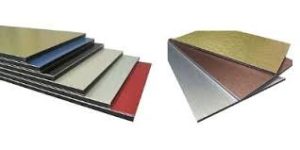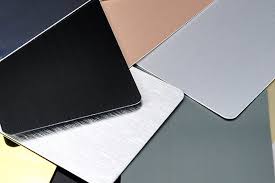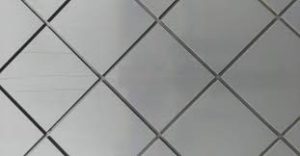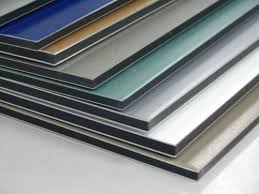Aluminum panel curtain wall is a common form of building curtain wall, which is mainly used to cover non-load-bearing walls of building facades. In China, aluminum veneer and metal aluminum composite panels are the two most frequently used aluminum curtain wall materials. They each have their own advantages and disadvantages. The following will make a detailed comparison of various aspects of aluminum veneer and metal aluminum composite panels.
1. Material comparison
Aluminum veneer uses 2.0-5.0mm industrial pure aluminum plate or high-grade aluminum alloy plate as the base material, while metal aluminum composite panel uses 0.5mm thick industrial pure aluminum plate as the surface and bottom plate, and the middle interlayer is PVC or PEC plastic through roller coating process Made by heat.
2. Fluorocarbon coating
The aluminum veneer is processed by 2-3 times of fluorocarbon spraying process. The fluorocarbon coating film thickness is relatively large, up to 30 μm or more than 40 μm, while a one-time pre-roller coating process usually processes the metal aluminum composite plate, and the coating film thickness is Generally 20μm.
3. Service life
The fluorocarbon spray coating of aluminum veneer has good weather resistance and corrosion resistance, and its service life can reach more than 15-20 years without fading or discoloration, while the service life of metal aluminum composite panels is generally about 10 years.

-
Comparison of tightness
The aluminum veneer is tightly welded at the four corners and has good wind pressure deformation resistance, while the metal aluminum composite panel has four corners open and has poor wind pressure deformation resistance.
5. Comparison of resistance to temperature denaturation
In the case of the same material, aluminum veneer is not sensitive to temperature changes and will not influence the performance of the wall panel. However, metal aluminum composite panels processed by ordinary gluing processes are prone to blistering, Peeling and other phenomena.
6. Comparison of lightning resistance performance
Aluminum veneer has good electrical conductivity and can quickly transmit lightning strike currents to the ground through the building grounding system, while metal aluminum composite panels cannot withstand lightning strikes. Strong currents are complex to ground through the aluminum composite panels, which will cause the aluminum panels to be struck by lightning. wear.
7. Wall panel shape
Aluminum veneer is easy to process into various shapes and arc-shaped special-shaped panels, with a wide range of bending angles; while the processing of metal aluminum composite panels is limited by the material, suitable for processing simple shapes, and is not suitable for bending inside corners and bending less than 90°.

8. Comparison of yield rate
The yield rate of aluminum veneer can reach 100%, which is relatively high, while the yield rate of metal aluminum composite panels is generally between 80-95%.
9. Yield comparison
Since the aluminum veneer manufacturer directly processes the aluminum veneer, the factory yield can reach 100%, while the metal aluminum composite panel is manually grooved on site. If the depth of the groove is not well controlled, the outer layer may be damaged. Aluminum plates cause bending and fracture, resulting in a yield rate of generally 95-98%.
10. Comparison of installation and construction quality
Aluminum veneer manufacturers control production quality by national standards. The quality of wall panels is reliable, which effectively guarantees installation and construction quality. However, because wall panels are mainly processed on-site, metal aluminum composite panels have poor quality control conditions and are prone to cutting corners and substandard materials. In a good situation, the quality of wall panels directly affects the quality of construction.

-
Comparison of applicable fields
Aluminum veneer is suitable for interior and exterior walls of buildings, elevated corridors, pedestrian bridges, low-rise curtain walls and other places, while metal aluminum composite panels are suitable for large-plane curtain wall decoration projects.
-
Environmental protection
Aluminum veneer has the advantages of waterproofing, fireproofing, weather resistance, corrosion resistance, and easy recycling, and it will not cause pollution to the environment. Meanwhile, the environmental protection of metal aluminum composite panels depends on the core material selected. Under normal circumstances, the core material will produce gas when exposed to high temperatures. Hazardous gases are not fireproof and challengingare  to recycle.
To sum up, aluminum veneer and metal aluminum composite panels each have their own characteristics and advantages, and the selection should be comprehensively considered based on specific project needs and actual conditions.
Supplier
TRUNNANO is a supplier of raw materials of metal alloy clads with over 12 years experience in nano-building energy conservation and nanotechnology development. It accepts payment via Credit Card, T/T, West Union and Paypal. Trunnano will ship the goods to customers overseas through FedEx, DHL, by air, or by sea. If you are looking for high-quality raw materials of metal alloy clads, please feel free to contact us and send an inquiry.
